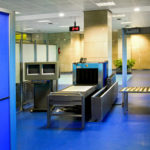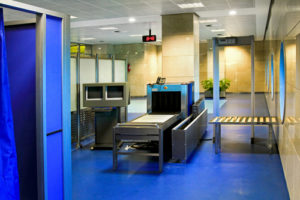
More school districts are turning to x-ray machines like those found in airports to strengthen and improve school security—a move that school safety experts say can improve physical safety as well as students’ and teachers’ emotional well-being while inside school buildings.
Patrick Fiel, public safety advisor for ADT Security Services and former executive director of school security for the Washington, D.C., public school system, said this type of technology can prevent contraband from entering schools.
“X-ray machines definitely can reduce crime and can act as a deterrent when people know they’re going through them,” said Fiel.
Jim Viscardi, vice president of sales for Smiths Detection, said his company has seen a huge increase in sales in the past year, and added that x-ray machines provide a level of school security that metal detectors can’t.
“A metal detector certainly will alert security officers as to whether a student, teacher, or school personnel have any sort of metal on their person. What it doesn’t provide is any indication as to what a student is carrying into a school,” said Viscardi.
“The x-ray system allows an officer to get an image of what’s inside a student’s bag to make sure there [are] no weapons, there’s no contraband. The name of the game here is keeping the kids safe,” Viscardi added.
In the past 12 months, Smiths Detection has installed more than 100 x-ray machines in schools in Virginia, Texas, Illinois, New York, and Tennessee. Viscardi declined to identify the school districts that have installed his company’s x-ray systems, but said they are often installed in more urban school districts.
“This major uptick in sales would indicate to us that x-rays are now a required piece for school security and that [they’re] being used successfully and most likely keeping threats and contraband out of the schools,” said Viscardi.
Fiel agreed that the machines are an important school safety tool.
“We found everything the machine is authorized to pick up. At the entry points at these locations, we eliminated [contraband] from going any further,” Fiel said of his experiences with the Washington, D.C., schools.
Viscardi said it’s important for schools to work out a multi-layered security plan and not rely solely on one method.
“The use of a single piece of equipment we’ve never felt is the best way to provide security,” said Viscardi. He suggests the use of several different technology-based components in order to provide the most secure campus possible.
“One layer is the metal detection to screen students, teachers, and other personnel. Another layer is the x-ray equipment to screen their belongings. A third layer might be integration of those systems with a closed circuit television system to provide not only comprehensive viewing of all the security checkpoints but also post-incident opportunities,” Viscardi said.
Fiel agreed that using technology can make a big difference when it comes to school safety.
“We definitely saw a dramatic reduction in incidences involving weapons [after installing x-ray machines],” Fiel said. During his time with the Washington, D.C., schools, Fiel and his team reduced crime by 90 percent after integrating technology into the district’s school safety approach. Fiel said that prevention, boosted by technology, played a major part in the reduction.
“X-ray [machines] have become a logical component; a required component in any kind of checkpoint you’re going to put in any kind of building,” Viscardi said.
- New film fights negative perception of teachers - September 16, 2011
- Textbook-free schools share experiences, insights - September 7, 2011
- Social websites are latest sources for plagiarized material - September 1, 2011


Comments are closed.